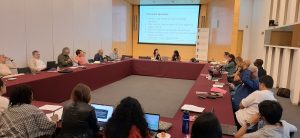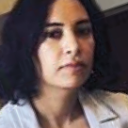Are we at a tipping point in conventional thinking about the economy? Can funders be part of solutions to problems that most of us have benefitted from?
The dominant economic policies of the past 50 years have left behind impoverished communities around the world and are widely believed to offer insufficient solutions to today’s global challenges, such as the climate crisis and rampant wealth inequality within and among countries. Creating space for alternative paradigms that can advance a more just and sustainable world, while challenging many of the attendant beliefs of neoliberalism—namely, market fundamentalism and retrenchment of the state’s role in regulating markets—has prompted the Ford Foundation, the Hewlett Foundation, and other philanthropies to fund a global network of university-based centers to advance more equitable growth policies and reimagine economic systems. That network met last month for their Annual Meeting (July 18 – 20) hosted by Colegio de Mexico in Mexico City.
The network is diverse by geography, gender, ethnicity and discipline. Some members of the network have already gained notoriety, such as Mariana Mazzucato and Daron Acemoglu, while others are emerging superstars.
If the network is successful, it could potentially make institutional philanthropy obsolete. The role of foundations – in funding everything from food pantries to climate tech – should logically be much diminished in a world where states and markets work better for everyone. Philanthropies are, however, undoubtedly needed to get us from here to there. The research, pedagogy and public engagement required to shape conventional wisdom on the economy is resource-intensive, and still underfunded. More foundation leadership is needed, and urgently. A new organization, the Global Fund for a New Economy, has been created to facilitate this leadership.
A Theory of Change
In recent decades, a ‘neoliberal’ economic worldview has dominated policy, markets and public opinion. This thinking, which has brought us to the brink of planetary boundaries and increased inequality in most countries around the world, was part of a concerted and multi-faceted effort led by academic luminaries such as Friedrich Hayek and Milton Friedman in the 1960s and 1970s.
Today, members of this network and others are at the vanguard of thinking about how to unseat those beliefs and replace them with something better. ‘This network brings together some of the best minds at our top universities in the Global South and Global North to work together to develop a new economics, that will provide proposals for a more equitable world as we transition to dealing with the complex challenges of, among others, new technology and climate change’, asserted Imraan Valodia, Director of the Southern Center for Inequality Studies at University of the Witwatersrand in South Africa.
The ‘how’ of their work spans research, curriculum development, cross-university exchanges, communications and engagement with policymakers and communities of practice. Research is a primary focus of many network members, but so is innovation in pedagogy. Wits University, for example, has created a cross-disciplinary Masters in Inequality Studies. Others have successfully engaged policymakers in countries like the US and Brazil. Universidad de los Andes in Colombia worked with students to brand its TREES program (Teaching and Researching Equitable Economics from the South) in preparation for outreach to a much larger community outside of higher education.
 At July’s meeting, topics included green industrial policy, teaching inequality and generating good jobs in the face of automation and AI. Discussions ranged from how to resurrect traditional ideas on industrial policy in a new socially informed and environmentally sustainability manner to a reconceptualization of teaching driven by moral imperatives and current economic realities in the Global North and South.
At July’s meeting, topics included green industrial policy, teaching inequality and generating good jobs in the face of automation and AI. Discussions ranged from how to resurrect traditional ideas on industrial policy in a new socially informed and environmentally sustainability manner to a reconceptualization of teaching driven by moral imperatives and current economic realities in the Global North and South.
According to Anush Kapadia Associate Professor Humanities and Social Sciences at IIT Bombay, ‘In recent times, a more explicit form of industrial policy has come back into focus as states grappled with the response to one crisis after the other, be it the financial crisis or Covid. Geopolitical rivalries have also emerged as some developing states have used industrial policy to move into technically advanced areas hitherto reserved for rich nations.’
‘With very little theorization on industrial policy from the Global South, our Pathways project at the American University in Cairo aims to fill in this strategic gap,’ said Amr Adly Assistant Professor, Department of Political Science at the American University in Cairo.
‘By engaging in a collaborative with partners in India, Mexico, Colombia and South Africa, we are collecting empirics that could contribute to our theorization effort for an industrial policy for and by the Global South that is responsive to the realities and contemporary challenges we face.’
Cross-cutting themes discussed during the meeting included questions on how to scale up good practices, deliver research impact and the role of the state, markets and societies. ‘The conversations at our Mexico City meeting highlighted the network’s intellectual and geographical diversity, strengthening relationships and fostering collaborations.
‘It’s essential to continue encouraging exchanges among academics from the North and South that can break down long standing disciplinary silos and facilitate new ideas on economic development’, said Laura Juarez, Associate Professor, Economic Studies Center at El Colegio de Mexico.
Building on this momentum, we expect that these centers will, collectively as well as in their respective countries and disciplines, contribute to new academic thinking and popular understanding of economic development and inequality issues.
Moving Forward
In the face of intersecting crisis and widening inequality, the EPE network presents a unique opportunity to inform and inspire new economic thinking that is pluralistic and value driven. Influencing economic policy ideas and development narrative to address real and pervasive gaps in the global economy and how it can optimally function is considerably an era defining issue. We believe the EPE network stands to make a meaningful contribution.
Margot Brandenburg is the Senior Program Officer Mission Investments at the Ford Foundation
Heba Abou Shnief is the Alliance Arab Region Representative






Comments (0)